新课标24个新话题目录:奇速英语.pdf
2023年中考英语复习24个话题之科普知识与现代技术

2023年中考英语复习24个话题之科普知识与现代技术话题:New technologies and inventions.I.Phrases and sentences for this topic and for writing.Activity 1.Question: what’s the most moving moment for you in the Beijing Winter Olympics?Conclusion: New technologies play an important part in the Beijing Winter Olympics, with the introduction of the new technologies, audience could get the best possible experience of watching games. people of all ages felt the touch of something warm and bright. Besides, everything was in control and in order. What’s more, Chinasucceeded in spreading our culture to the whole world. So it is lucky of us to live ina powerful country, isn’t it?Activity2. Brain storming and learn to use and grasp the key words..Ask students: Can you give us some examples to show how our country is powerful?Conclusion: Let’s take journey to space as an example. In 2021,journey to spacemade great achievements .spaceship with people entered our own spacestation ,Tianwen No.1 landed on the Mars successfully. Fast discovered more stars for further study. Chang’e 5 carried samples on the moon back to the earth.Activity3. Free talk about new inventions that have changed our life.There are many new inventions that have changed our life.for example, the internet makes a lot of sense to everyone,it makes it possible to do many things without going out.so it’d hard to imagine life without it, because it has become a part of our life.Conclusion: All in all, new technologies and inventions make a difference to our life and our country and it makes our country become a much more powerful thanbefore.II.Exercises.一.完形填空.You might have noticed that sometimes, when you're playing mobile games or taking a video call, the picture suddenly freezes because the network speed is too 1 . When you try to download a movie on your phone, it seems to take forever.These annoying things will soon become a thing of the 2 , because China just issued (发放)licenses for 5G networks in June, 2019. This means that China's telecommunications(电信)companies will be able 3 5G networks speeds to mobile phone users.The “G” in “5G” 4 generation (of mobile network technology). 1G let us talk to each other. 2G let us send messages. 3G gave us mobile data and internet, and 4G made all these things much 5 . So 6 will 5G bring?First of all, 5G is so fast that it will allow you to download an entire HD movie in seconds.The delay(延迟) between sending 7 receiving data will be shortened. Because of this8 in speed, it will be possible to create and use new kinds of technology. Robots will be used to do operations(手术) because 9 will be able to control them from somewhere else without any delay. Self-driving cars will be able to run more 10 because they can smoothly communicate with each other, traffic lights and road sensors(传感器).All in all, 5G will shape every type of technology that it touches. And you won't have to wait too long for that to happen.1.A.small B.Slow C.fast D. high2.A.future B.past C.old D. present3.A.offer B.provide C.to offer D.to provide4.A.goes to B.looks like C.relies on D.stands for5.A.fast B.faster C.fastest D.the fastest6.A.how B.why C.what D.when7.A.or B.from C.to D.and8.A.increase B.competition C.delay D.practice9.A.singers B.doctors C.engineers D. scientists10.A.safely B.carefully C.quickly D.widely二.阅读理解.You don’t need to get in a time-travelling machine to see how technology will change our lives, such as the way we shop. Several new technologies that are to change your buying habits already appea r. Let’s see what’s in store for your future shopping.Try it on, virtually(虚拟地). Want to shop online for a new pair of glasses? You don’t need to guess which pair looks best on you—use the eBay Fashion iPhone app to try a pair of glasses you’re check ing out on a picture of your face. But what about buying something bigger? Thanks to Microsoft Kinect’s action tracking(跟踪) camera, you can cover clothes on your screen body. You can even choose the background of your virtual fitting room to improve your shopping experience.Get a perfect, custom fit. Everyone’s body is shaped differently. To get a perfect fit, you sometimes have to get your clothes changed. But by using 3-D scanning technology, all the clothes you buy will fit your body perfectly. Some companies scan(扫描) your body using High-tech to get the real sizes, so they can make special clothes just for you.High-tech shopping carts(推车) and checkout counters(收银台). High-tech shopping carts could be common in malls and supermarkets in the future. Microsoft Kinect-enabled carts are under test. The cart can follow you along the aisles(通道), controlled only by your movement and your voice.In the United States, several supermarkets use a certain set called “Scan It” that gives buyers the freedom to scan pro ducts on their own while they shop. If we don’t want to wait in line before the checkout counters, we can use Toshiba’s new object Recognition Scanner. The machineidentifies(辨认) a product as soon as it’s placed in front of a camera just by its shape and c olor, even if it has no bar code.1.Which of the following has the same meaning as the underlined word “appear “A turn outB turn down C. turn up D. turn on2.According to Paragraph 2, the eBay Fashion iPhone app can .A. only make pictures of our facesB. help us sell more clothes onlineC. create us a virtual dressing roomD. choose suitable glasses for us3.Which of the following can help get the correct shape of our body?A. Object Recognition Scanner.B. The eBay Fashion iPhone app.C.3-D scanning technology.D.Microsoft Kinect-enabled carts.4.What can we infer from this passage?A. Checkout counters will disappear from supermarkets in future.B .High-tech shopping carts will be widely used in malls and supermarkets.C.“Scan It” cannot be used by buyers themselves.D. The new technologies are only dreams that are impossible to come true.5.This passage mainly talks about .A. a new time-travelling machineB. the influence of new technologyC. some inventions to change habitsD. the ways for future shopping三.补全对话.A.Excuse me, do you know where the Ordos Museum is?B.Sure . 1 .A.Could you tell me how to go there?B.Certainly. Go along this street and turn right at the third turning . Then walk until you see the building of Ordos Theater.2. _______.A.Oh, you mean it’s across from the building of Ordos Theater?B.Exactly.A.3. _______.B. Two kilometers.A.4. _______.B. No. You’d better take a taxi. It’s fast and convenient.A. Great! Oh ,and one more thing ,What time does the museum close?B.5. You’d better ask for the detailed information in the museum.A.Thank you very much.B.You are welcome.own.It is helping with social distancing 1 fighting the spread of the coronavirus. It also helps older passengers and those 2 otherwise need assistance walking the last few steps to the boarding gate.The mobility system seats one person and runs on its own 3 hitting anything. It has a pre-programmed path of about 600 meters at Tokyo's Haneda International Airport. It was shown Monday by WHILL, the company behind the technology.WHILL Chief Executive Satoshi Sugie said robotics and self-driving technology reduce the need for a human at the wheel. They are good for these times of "4 with" coronavirus."We are...developing our business in order 5 restore a world where people can enjoy moving around with peace of mind," he told The Associated Press.The ride lasts several minutes. It travels from the security area to the boarding gate at a speed of 3.5 kilometers per hour. But many people hope the technology can help in other places, such as hospitals or parks. The technology uses sensors and cameras to see a clear path and 6 hitting those walking toward it.It could also help Japan free up laborers. Japan, like many other nations, suffers from a labor shortage. The technology could free a worker to do 7 job.Tests have been carried out at several airports8 last year, including John F. Kennedy International Airport in New York. The company hopes to put it in airports around the world.The person on the machine can start or stop it through a simple controller. It runs on batteries and is programmed to return to 9 it started when its passenger gets off.Anyone needing help walking long distances can use it at Terminal One at Haneda airport. It is 10 the "last-mile mobility," says WHILL.五..任务型阅读。
奇速英语24个故事
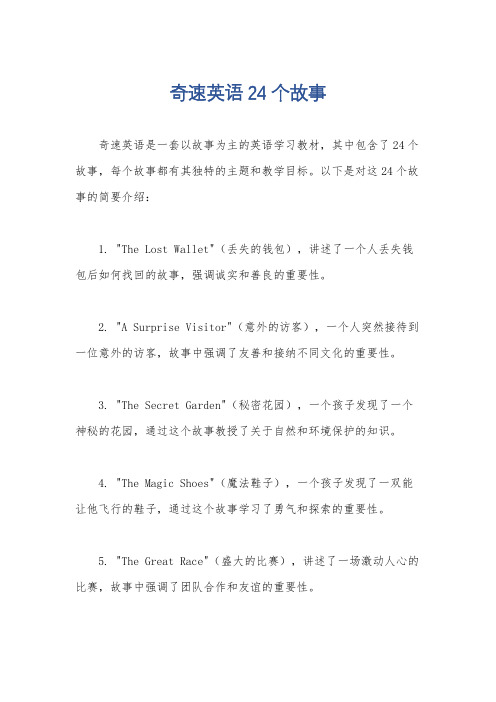
奇速英语24个故事奇速英语是一套以故事为主的英语学习教材,其中包含了24个故事,每个故事都有其独特的主题和教学目标。
以下是对这24个故事的简要介绍:1. "The Lost Wallet"(丢失的钱包),讲述了一个人丢失钱包后如何找回的故事,强调诚实和善良的重要性。
2. "A Surprise Visitor"(意外的访客),一个人突然接待到一位意外的访客,故事中强调了友善和接纳不同文化的重要性。
3. "The Secret Garden"(秘密花园),一个孩子发现了一个神秘的花园,通过这个故事教授了关于自然和环境保护的知识。
4. "The Magic Shoes"(魔法鞋子),一个孩子发现了一双能让他飞行的鞋子,通过这个故事学习了勇气和探索的重要性。
5. "The Great Race"(盛大的比赛),讲述了一场激动人心的比赛,故事中强调了团队合作和友谊的重要性。
6. "The Mysterious Box"(神秘的盒子),一个人发现了一个神秘的盒子,通过解开盒子中的谜题,故事中传达了解决问题和创造力的重要性。
7. "A Trip to the Zoo"(去动物园旅行),一个家庭去动物园旅行的故事,通过这个故事学习了关于动物和自然的知识。
8. "The Brave Firefighter"(勇敢的消防员),一个消防员在火灾中展现勇敢和冷静的故事,故事中传达了安全意识和应急处理的重要性。
9. "The Magical Forest"(神奇的森林),一个孩子探索神奇森林的故事,通过这个故事学习了关于植物和生态系统的知识。
10. "The Lost Puppy"(迷路的小狗),一个孩子帮助一只迷路小狗找到家的故事,强调了关心和帮助他人的重要性。
《奇速英语.24个故事串记3500词汇》
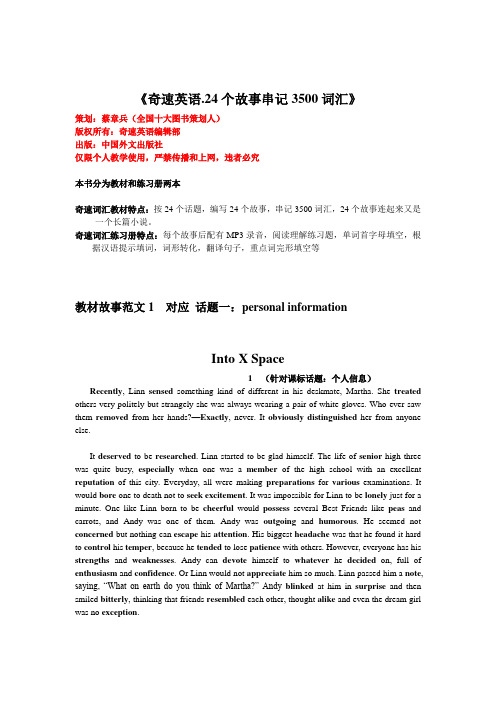
《奇速英语.24个故事串记3500词汇》策划:蔡章兵(全国十大图书策划人)版权所有:奇速英语编辑部出版:中国外文出版社仅限个人教学使用,严禁传播和上网,违者必究本书分为教材和练习册两本奇速词汇教材特点:按24个话题,编写24个故事,串记3500词汇,24个故事连起来又是一个长篇小说。
奇速词汇练习册特点:每个故事后配有MP3录音,阅读理解练习题,单词首字母填空,根据汉语提示填词,词形转化,翻译句子,重点词完形填空等教材故事范文1 对应话题一:personal informationInto X Space1 (针对课标话题:个人信息)Recently, Linn sensed something kind of different in his deskmate, Martha. She treated others very politely but strangely she was always wearing a pair of white gloves. Who ever saw them removed from her hands?—Exactly, never. It obviously distinguished her from anyone else.It deserved to be researched. Linn started to be glad himself. The life of senior high three was quite busy, especially when one was a member of the high school with an excellent reputation of this city. Everyday, all were making preparations for various examinations. It would bore one to death not to seek excitement. It was impossible for Linn to be lonely just for a minute. One like Linn born to be cheerful would possess several Best Friends like peas and carrots, and Andy was one of them. Andy was outgoing and humorous. He seemed not concerned but nothing can escape his attention. His biggest headache was that he found it hard to control his temper, because he tended to lose patience with others. However, everyone has his strengths and weaknesses. Andy can devote himself to whatever he decided on, full of enthusiasm and confidence. Or Linn would not appreciate him so much. Linn passed him a note, saying, “What on earth do you think of Martha?” Andy blinked at him in surprise and then smiled bitterly, thinking that friends resembled each other, thought alike and even the dream girl was no exception.“Martha, it is not late to drop out of the match.” whispered Linn, coving his mouth with a hand and offering his characteristic grin when Professor Mr. Brown turned around.“Do you really think I am a coward?” thought Martha annoyed, giving him an angry stare.Speaking of the annual Basketball Match for Mixed Gender, it is the most significant festival for students. There is a good saying: couples together, happy forever! But he can’t imagine Martha’s joining. Martha, in his eyes, was stubborn and out of fashion. Of course, in terms of personal quality, Martha, a girl of strict morality, had a good character. But he is no worse. Who didn’t regard him as tall and handsome? Thinking of this, he slipped a very little mirror hidden in the drawer into his hand. He saw a square face, then high-arched nose, bushy eyebrows and big eyes. Such a good-looking face, however, won him the nickname Bad Guy by his Best Friends. A saying goes that while one’s real name doesn’t match his personality, his nickname does. Friends may be joking, but his ex-girlfriends’ frequent sentence settled in his memory that you were rotten to the core. Linn breathed a sigh. He stole a glance at her in the mirror. She was tall and slim with smooth and black hair. Large quantities of people would have chased her. However, she seemed to stay away from them on purpose. She liked to stand by the school garden alone, taking care of the flowers and grass. Whenever noticed, she was found speaking secretly to them. She was neither passive nor weak. She always stuck to principle, had an independent mind and never feared hardship.The match came soon. The whole class was divided two teams which were tied till the last ten minutes. Then Martha as a substitute joined the fight. Andy was passing on the basketball to Linn when unexpectedly Martha got it, dashing to the destination at the astonishing speed of a fling rocket. She scored the goal before others realized what happened. Then the match finished. Martha was just on the point of leaving the court, seemingly to avoid the noisy crowd. Over came Linn and Andy.“Hi, Martha, you are absolutely superior to us. I didn’t expect you had such a gift for basketball. You...”Andy was about to continue when Linn patted him on the back, saying, “It’s time to be honeymouthed. I feel sympathy for your basketball skill.”“Just by chance. My couch was very strict with me.” she smiled, wiping the sweat off the forehead and taking out the gloves.“You are too modest. It’s so hot. Why…” Linn bent to help clear up her things. Suddenly, a sense of excitement poured out of his heart. He picked up the other glove and wanted to help her put it on. Just when he touched her hand, something like lightning shocked him. He looked her in the eye rather confused, but Martha drew back her hand and avoided his eyes, hurrying out of the gym without a word. (141个黑体词)译文:X空间林恩最近发现同桌马莎莎有点不对劲。
高考3500词汇表,奇速英语24个故事记完中学3500单词

高考3500词汇表,奇速英语24个故事记完中学3500单词高考3500词汇表,奇速英语24个故事记完中学3500单词你是否常常会因多如牛毛的单词而忙得焦头烂额,你是否为自己在背记与遗忘的边缘徘徊而扒耳搔腮,是否想在一早一夕之间轻易拿下那些晦涩难懂的英语单词,英语单词速记法层出不穷,初中到大学的英语词汇书更是林林总总。
而你曾想到过,或许你不必刻意去遵循那记忆的条条款款,或许一个生动有趣的而故事就能让你牢牢记住几千词汇。
而它就是资深英语教育专家兼记忆大师蔡章兵教授的《奇速英语24个故事串记中学3500词汇》(下简称为《24个故事》)。
《24个故事》又名《奇速英语听说读写联动教材》。
全书总共由24个独立的双语小故事组成,而这24个独立的小故事彼此之间又环环相扣,合聚为一个完整的情节跌宕起伏的中篇小说。
故事的内容围绕着中学生颇感兴趣的话题展开,其中融入了科幻,穿越,惊险等奇异的元素,情节也生动曲折,悬念丛生。
而《24故事》不仅仅是故事而已,它归根到底是一本实用的英语单词词汇书。
围绕着每个故事都进行了词汇、句型、写作、完型等方面的扩展,涵盖了词汇、语法、写作、阅读等大纲要求的模块。
因此,学生可以在享受故事情节的轻松时刻,同时于潜移默化中牢记中学考纲里的单词。
可谓一举两得。
在整体了解了单个故事的情节之后,学生可以通过“佳句赏析”来进一步加深对文章的理解。
其中,句型相对复杂或生词集中的句子配有“句法分析”和“句子翻译”,让学生可以从句子内涵以及语法结构两方面入手学习,轻松攻克长难句。
另外一个特点在于“句法收获”,帮助学生以阅读和理解长难句的方式累积大量的重要句法结构。
这些句法结构大多包含了考纲中的语法重点,因此可以辅助学生在背记单词的同时也为中、高考做好十足的准备,此外,“句法收获”还囊括了很多地道的英式表达,可以于无形中培养学生适应本土英语的思维模式。
无论是从考试还是长远的英语学习打算来看,《24个故事》给学生带来的远不止记住3500个单词那样简单。
英语课程标准-话题项目表

英语课程标准-话题项目表(这是新颁布课标的话题项目表,尽量选用二级名称作为话题名称,请勿自造话题名称。
)1.个人情况(Personal background)(1) 个人情况(Personal information)(2) 家庭信息(Family information)(3) 学校信息(School information)(4) 兴趣与爱好(Interests and hobbies)(5) 工作与职业(Jobs and careers)2.家庭、朋友与周围的人(Family, friends and people around)(6) 家人和亲友(Family and relatives)(7) 朋友(Friends)(8) 其他人(Other people)3.周围的环境(Personal environment)(9) 房屋与住所(Houses and apartments)(10) 居室(Rooms in homes)(11) 家具和家庭用品(Furniture & household items)(12) 社区(Community)4.日常活动(Daily routines)(13) 家庭生活(Life at home)(14) 学校生活(School life)(15) 周末活动(Weekend activities)5.学校(School)(16) 学校设施(School facilities)(17) 学校人员(People at school)(18) 学习科目(School subjects)(19) 学校活动(School activities)6.个人兴趣(Personal interests)(20) 游戏与休闲(Games and leisure)(21) 爱好(Hobbies)(22) 娱乐活动(Entertainments)(23) 旅游(Tourism)7.情感与情绪(Feelings and moods)(24) 情感(Feelings)(25) 情绪(Moods)8.人际交往(Interpersonal communications)(26) 社会行为(Social behaviours)(27) 合作与交流(Cooperation and communication)9.计划与安排(Plans and arrangements)(28) 计划(Planning)(29) 安排(Arranging)10.节假日活动(Festivals, holidays and celebrations)(30) 节日与假日(Festivals and holidays)(31) 庆祝活动(Celebrations)11.购物(Shopping)(32) 购物计划(Shopping planning)(33) 商品(Goods)(34) 选择(Selecting)(35) 付款(Payment)(36) 个人喜好(Personal preference)12.饮食(Food and drink )(37) 食物(Food)(38) 饮料(Drinks)(39) 饮食习俗(Eating customs)(40) 点餐(Ordering food and drink)13.卫生与健康(Hygiene and health)(41) 身体部位(Parts of body)(42) 体育健身(Physical fitness and exercise)(43) 个人卫生(Personal hygiene)(44) 疾病(Illnesses)(45) 健康饮食(Health diet)(46) 医疗(Medical care)14.安全与救护(Safety and first aid)(47) 安全守则(Safety rules)(48) 意外(Accidents)(49) 急救(First aid)(50) 自我保护(Self protection)15. 天气(Weather)(51) 天气情况(Weather conditions)(52) 天气预报(Weather report)(53) 衣着与天气(Appropriate dressing for the weather)16.文娱与体育(Recreation and sports)(54) 电影与戏剧(Movies and theatre)(55) 音乐与舞蹈(Music and dance)(56) 体育与赛事(Sports and matches)17.旅游与交通(Travel and transport)(57) 旅行(Travel)(58) 交通运输方式(Modes of transportation)(59) 交通标志(Traffic signs)(60) 使用地图(Reading maps)18.通讯(Communications)(61) 写信(Writing letters)(62) 打电话(Making phone calls)(63) 使用互联网(Using the Internet)19. 语言学习( Language learning)(64) 语言学习经历(Language learning experiences)(65) 语言与文化(Language and culture)(66) 语言学习的策略(Language learning strategies)(67) 体态语(Body language)20.自然(Nature)(68) 动物和植物(Animals and plants)(69) 山川与河流(Mountains and rivers)(70) 季节(Seasons)(71) 宇宙(Universe)(72) 人与自然(Man and nature)21.世界与环境(The world and the environment)(73) 国家与民族(Countries and nationalities)(74) 环境保护(Environmental protection)(75) 人口(Population)22.科普知识与现代技术(Popular science and modern technology)(76) 数字与数据(Figures and data)(77) 科普知识(Popular science)(78) 发明与技术(Inventions and technological advances)(79) 信息技术(Information technology)23.历史与社会(History and society)(80) 中国历史与世界历史(History of China and the world)(81) 著名人物(Famous people)24.故事与诗歌(Stories and poems)(82) 故事(Stories)(83) 诗歌(Poems)(84) 短剧(Short plays)(85) 作家(Writers)人生渺如尘埃,小如露珠,寻常如泥土,从不可知处而来,到不可知处而去。
奇速英语外研版七年级英语下册电子课本教材教科书目录
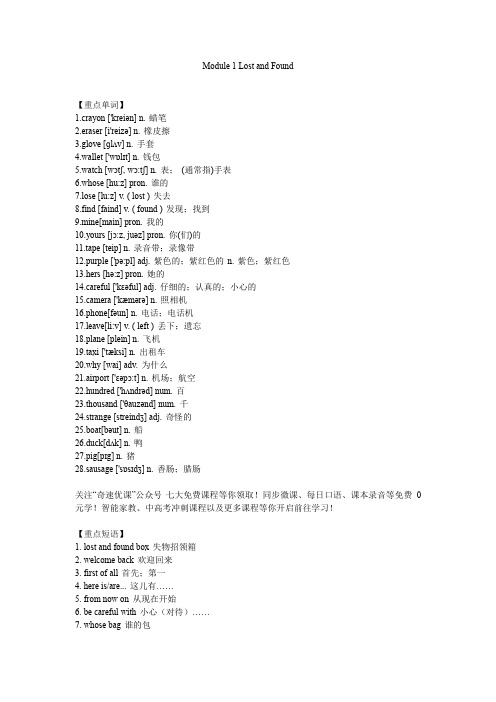
Module 1 Lost and Found【重点单词】1.crayon ['kreiən] n. 蜡笔2.eraser [i'reizə] n. 橡皮擦3.glove [ɡlʌv] n. 手套4.wallet ['wɒlɪt] n. 钱包5.watch [wɔtʃ, wɔ:tʃ] n. 表;(通常指)手表6.whose [hu:z] pron. 谁的7.lose [lu:z] v. ( lost ) 失去8.find [faind] v. ( found ) 发现;找到9.mine[main] pron. 我的10.yours [jɔ:z, juəz] pron. 你(们)的11.tape [teip] n. 录音带;录像带12.purple ['pə:pl] adj. 紫色的;紫红色的n. 紫色;紫红色13.hers [hə:z] pron. 她的14.careful ['kεəful] adj. 仔细的;认真的;小心的15.camera ['kæmərə] n. 照相机16.phone[fəun] n. 电话;电话机17.leave[li:v] v. ( left ) 丢下;遗忘18.plane [plein] n. 飞机19.taxi ['tæksi] n. 出租车20.why [wai] adv. 为什么21.airport ['εəpɔ:t] n. 机场;航空22.hundred ['hʌndrəd] num. 百23.thousand ['θauzənd] num. 千24.strange [streindʒ] adj. 奇怪的25.boat[bəut] n. 船26.duck[dʌk] n. 鸭27.pig[pɪg] n. 猪28.sausage ['sɒsɪdʒ] n. 香肠;腊肠关注“奇速优课”公众号七大免费课程等你领取!同步微课、每日口语、课本录音等免费0元学!智能家教、中高考冲刺课程以及更多课程等你开启前往学习!【重点短语】1. lost and found box 失物招领箱2. welcome back 欢迎回来3. first of all 首先;第一4. here is/are... 这儿有……5. from now on 从现在开始6. be careful with 小心(对待)……7. whose bag 谁的包8. talk to sb. 与某人交谈9. mobile phone 移动电话;手机10. get on 上车( get off 下车)11. two thousand 两千(thousands of 数以千计的)12. look for 寻找13. at the moment 现在14. in a hurry 匆匆忙忙15. a lot of 许多,大量16. hundreds of 几百;成百上千17. on the train 在火车上18. every day 每天19. such as 例如20. make a list of... 列一张……的清单21. ask/answer questions 问/回答问题【重点句型】1.Welcome back to school!欢迎回到学校!2.Whose bag is this?这是谁的书包?3.It’s mine.它是我的。
蔡章兵奇速英语高效学习法.pdf
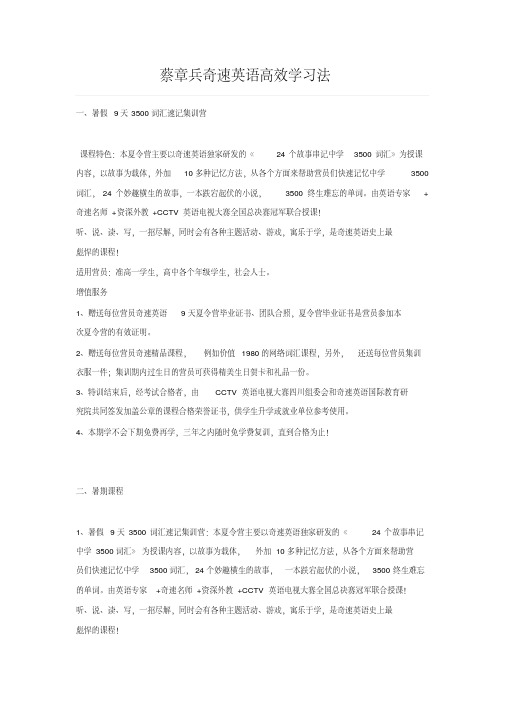
蔡章兵奇速英语高效学习法一、暑假9天3500词汇速记集训营课程特色:本夏令营主要以奇速英语独家研发的《24个故事串记中学3500词汇》为授课内容,以故事为载体,外加10多种记忆方法,从各个方面来帮助营员们快速记忆中学3500词汇,24个妙趣横生的故事,一本跌宕起伏的小说,3500终生难忘的单词。
由英语专家+奇速名师+资深外教+CCTV英语电视大赛全国总决赛冠军联合授课!听、说、读、写,一招尽解,同时会有各种主题活动、游戏,寓乐于学,是奇速英语史上最彪悍的课程!适用营员:准高一学生,高中各个年级学生,社会人士。
增值服务1、赠送每位营员奇速英语9天夏令营毕业证书、团队合照,夏令营毕业证书是营员参加本次夏令营的有效证明。
2、赠送每位营员奇速精品课程,例如价值1980的网络词汇课程,另外,还送每位营员集训衣服一件;集训期内过生日的营员可获得精美生日贺卡和礼品一份。
3、特训结束后,经考试合格者,由CCTV英语电视大赛四川组委会和奇速英语国际教育研究院共同签发加盖公章的课程合格荣誉证书,供学生升学或就业单位参考使用。
4、本期学不会下期免费再学,三年之内随时免学费复训,直到合格为止!二、暑期课程1、暑假9天3500词汇速记集训营:本夏令营主要以奇速英语独家研发的《24个故事串记中学3500词汇》为授课内容,以故事为载体,外加10多种记忆方法,从各个方面来帮助营员们快速记忆中学3500词汇,24个妙趣横生的故事,一本跌宕起伏的小说,3500终生难忘的单词。
由英语专家+奇速名师+资深外教+CCTV英语电视大赛全国总决赛冠军联合授课!听、说、读、写,一招尽解,同时会有各种主题活动、游戏,寓乐于学,是奇速英语史上最彪悍的课程!适用营员:准高一学生,高中各个年级学生,社会人士。
2、24个故事网络直播课:中国英语教育专家蔡章兵老师领衔的名师团队主创;囊括中学新课标3500词汇,每个单词都采用奇速英语专家团队独创的记忆方法;每个话题一个故事,24个故事串联成一个中篇小说,故事精彩纷呈,引人入胜。
奇速英语24个故事pdf

奇速英语24个故事pdf标题:奇速英语24个故事PDF引言概述:奇速英语24个故事PDF是一本以故事为主题的英语学习资料。
本文将从五个大点进行阐述,包括故事的特点、故事的分类、故事的学习方法、故事的应用和奇速英语24个故事PDF的优势。
最后,总结本文的内容。
正文内容:1. 故事的特点:1.1 故事具有情节和人物,能够吸引学习者的兴趣。
1.2 故事中常包含生活场景和实用语言,有助于学习者的语言运用能力。
1.3 故事能够帮助学习者提高听力和阅读能力。
2. 故事的分类:2.1 真实故事:以真实事件或人物为背景,能够增加学习者的文化知识。
2.2 虚构故事:以虚构的情节和人物为基础,能够激发学习者的想象力和创造力。
2.3 寓言故事:通过寓意和象征,传递一定的道德或哲理。
3. 故事的学习方法:3.1 多听多读:通过听故事和读故事,提高学习者的听力和阅读能力。
3.2 多模仿多模仿:模仿故事中的发音和语调,提高学习者的口语表达能力。
3.3 多讨论多讨论:与他人讨论故事中的情节和主题,提高学习者的思维和表达能力。
4. 故事的应用:4.1 提高词汇量:通过故事中的词汇,扩展学习者的词汇量。
4.2 加深语法理解:通过故事中的语法结构,加深学习者对语法的理解。
4.3 培养语感:通过故事中的语言表达,培养学习者的语感和语言感知能力。
5. 奇速英语24个故事PDF的优势:5.1 方便学习:以PDF格式发布,学习者可以随时随地进行学习。
5.2 多样性:包含了不同类型的故事,满足学习者的不同需求。
5.3 专业性:故事内容准确、专业,能够帮助学习者提高英语水平。
总结:本文从故事的特点、分类、学习方法、应用和奇速英语24个故事PDF的优势五个大点进行了详细阐述。
通过学习故事,学习者可以提高听力、阅读、口语和写作能力,同时还能够扩展词汇量、加深语法理解和培养语感。
奇速英语24个故事PDF作为一本专业的学习资料,具有方便学习、多样性和专业性的优势,能够帮助学习者有效提高英语水平。
奇速英语24个故事串记3500词汇文本
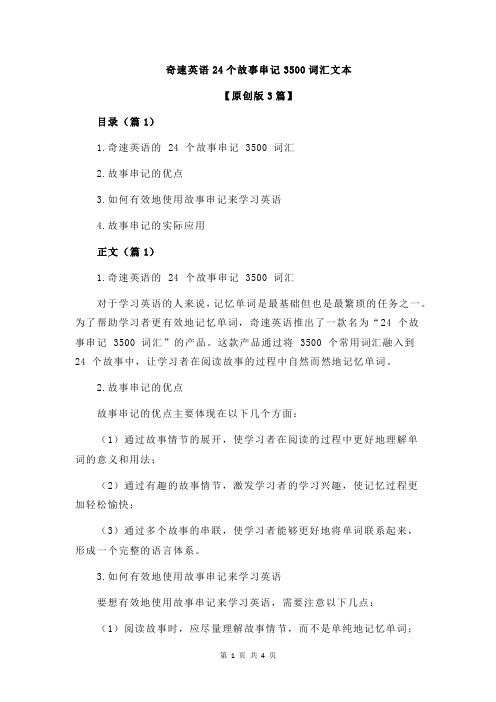
奇速英语24个故事串记3500词汇文本【原创版3篇】目录(篇1)1.奇速英语的 24 个故事串记 3500 词汇2.故事串记的优点3.如何有效地使用故事串记来学习英语4.故事串记的实际应用正文(篇1)1.奇速英语的 24 个故事串记 3500 词汇对于学习英语的人来说,记忆单词是最基础但也是最繁琐的任务之一。
为了帮助学习者更有效地记忆单词,奇速英语推出了一款名为“24 个故事串记 3500 词汇”的产品。
这款产品通过将 3500 个常用词汇融入到24 个故事中,让学习者在阅读故事的过程中自然而然地记忆单词。
2.故事串记的优点故事串记的优点主要体现在以下几个方面:(1)通过故事情节的展开,使学习者在阅读的过程中更好地理解单词的意义和用法;(2)通过有趣的故事情节,激发学习者的学习兴趣,使记忆过程更加轻松愉快;(3)通过多个故事的串联,使学习者能够更好地将单词联系起来,形成一个完整的语言体系。
3.如何有效地使用故事串记来学习英语要想有效地使用故事串记来学习英语,需要注意以下几点:(1)阅读故事时,应尽量理解故事情节,而不是单纯地记忆单词;(2)遇到生词时,可以通过上下文来猜测单词的意义,然后再查阅词典确认;(3)定期复习,巩固记忆,防止遗忘。
4.故事串记的实际应用故事串记不仅适用于英语学习,也同样适用于其他语言的学习。
例如,对于学习法语的人来说,他们可以通过阅读有趣的法语故事来记忆单词。
同样,对于学习日语的人来说,他们也可以通过阅读日语故事来记忆单词。
目录(篇2)1.奇速英语的背景和特点2.24 个故事串记 3500 词汇的概述3.故事串记的学习方法和优势4.故事串记的具体内容和示例5.结论:故事串记在英语学习中的重要性正文(篇2)奇速英语是一家致力于英语学习的教育机构,其特点在于创新的教学方法和独特的学习资源。
在众多的学习资源中,24 个故事串记 3500 词汇是其一项重要的成果。
24 个故事串记 3500 词汇是奇速英语根据英语学习的特点和需求,精心挑选和编制的。
[VIP专享]英语课标的24个话题
![[VIP专享]英语课标的24个话题](https://img.taocdn.com/s3/m/1781ae320b1c59eef8c7b4f8.png)
中学英语课程标准24个话题项目说明:标*号的项目为八级要求。
1. 个人情况(Personal information)(1)Individual data (name, age, date of birth, place of birth, telephone number, address, postal code, e-mail address, ID number, etc. )(2)Family data (name, age, relatihip, etc. )(3)School data (school, grade, class, teacher, etc. )(4)Data uses (filling out forms and applicati, etc. )(5)Jobs and career (office worker, worker, teacher, doctor, farmer, driver, official, etc. )2. 家庭、朋友与周围的人(Family, friends and people around)(1)Family and relatives (grandparents, parents, brother, sister, aunt, uncle, cousin, son, daughter, etc. )(2)Friends (close neighbour, schoolmate, classmate, roommate, team-mate, etc. )(3)Other people (neighbour, local shopkeeper, teacher, colleague, etc. )3. 周围的环境(Personal environments)(1)Kinds of homes (apartment, house, dormitory, etc. )(2)Rooms in homes (bedroom, kitchen, living room, bathroom, etc. )(3)Furniture & home items ( table, chair, sofa, desk, bed, television, etc. )(4)Schools (classroom, playground, hall, computer room, office, etc. )(5)Outside (grocery store, book shop, clothing store, market, bank, library, museum, cinema, theatre, park, road, etc. )4. 日常活动(Daily routines)(1)Getting ready (time for school, playing, bed)(2)Dressing, brushing teeth, washing hands and face, taking a shower, etc.(3)Eating (breakfast, lunch, snacks and dinner)(4)Daily chores (tidying, sweeping, doing dishes, cooking)(5)Homework (reading, writing, studying, etc. )(6)Family time (watching television, going out, visiting, etc. )5. 学校生活(School life)(1)School building (classroom, office, library, washroom, etc. )(2)School organization (grade, class, subject, break, schedule, etc. )(3)People (teacher, classmate, schoolmate, cleaner, etc. )(4)Subjects (Chinese, maths, English, geography, history, etc. )(5)Activities (sports, extra-curricular involvement, trip, etc. )(6)Instructi (Please listen, read, get into groups, act, etc. )(7)Educational methods (preview, review, discuss, presentation, summary)6. 兴趣与爱好(Interests and hobbies)(1)Less (music, dance, acting, sport, etc. )(2)Games (physical games, computer games, sports, etc. )(3)Hobbies (collecting stamps, coins, dolls, etc. )(4)Reading (books, newspapers, comics, etc. )(5)Cultural events (film, theatre, concert, opera, etc. )(6)Entertainment (listening to radio, watching TV, playing CD, DVD, etc. )(7)Socializing (having parties, issuing invitati, going for picnics, going sightseeing, entertaining guests, etc. )(8)Expressing your reacti to these activities7. 个人感情(Emoti)(1)Describing feelings (happy, sad, angry, upset, pleased, proud, lonely, worried, nervous, afraid, etc. )(2)Expressing emoti (smiling, laughing, crying, shouting, etc. )(3)Describing facial expressi and gestures8. 人际关系(Interpersonal relatihips)(1)People (parent, brother, sister, other family members, friend, neighbour, teacher, etc. )(2)Social behaviours (greeting, introducing, giving thanks, asking for permission, asking for help, solving problems, dealing with conflicts, etc. )(3)Getting together (making plans / arrangements, time, date, place, event, etc. )9. 计划与愿望(Plans and intenti)(1)Planning (holidays, social events, travel, further education, jobs, etc. )(2)Organising ( asking for advice, asking for help, asking for permission, exploring possibilities, expressing needs and wants, etc. )10. 节假日活动(Festivals, holidays and celebrati)(1)Cultural festivals ( Spring Festivals, New Year's Day, Christmas, etc. )(2)Religious holidays (Christmas, Easter, Ramada, etc. )(3)Personal celebrati (birthday, anniversary, graduation, etc. )11. 购物( Shopping)(1)Planning (shopping list, needs, wants, etc. )(2)Products (clothes, groceries, personal items, electronics, etc. )(3)Selecting (quality, weights, measures, size, colour, style, etc. )(4)Paying (price, quantity, etc. )12. 饮食(Food and drink)(1)Meats (beef, chicken, pork, fish, etc. )(2)Soups (chicken, tofu, vegetable, etc. )(3)Vegetables (cabbage, eggplant, etc. )(4)Staple food (rice, bread, noodles, cake)(5)Drinks (milk, water, juice, soft drink, coke, alcoholic drinks, beer, wine, etc. )(6)Fast foods ( sandwiches, noodles, dumplings, hot dogs, hamburgers, chips, etc. )(7)Snacks (ice cream, chips, etc. )(8)Eating customs (ways of eating, kinds of food, times to eat, table manners, chopsticks, knife, fork, etc. )(9)Requesting or offering different foods and drinks(10)Likes and dislikes (favourite food, favourite drinks, etc. )(11)Ordering food and/or drinks13. 健康(Health)(1)Eating habits(2)Physical fitness and exercise(3)Personal hygiene(4)Illnesses (stomachache, headache, flu, cold, etc. )(5)Medicati(6)Accidents(7)Doctors, nurses & hospitals(8)Describing problems (parts of the body, pains, etc. )(9)Medical insurance14. 天气(Weather)(1)Describing weather (sunny, cloudy, windy, rainy, hot, warm, cold, cool, etc. )(2)Extreme weather (storms, gales, hurricanes, etc. )(3)Dressing for the weather ( coat, hat, umbrella, raincoat, windbreaker, etc. )15. 文娱与体育(Entertainment and sports)(1)Movies and theatre(2)Music and dance (folk music and dance, popular music and classical music)(3)Team games (football, basketball, volleyball, etc. )(4)Games of two or four (table tennis, tennis, golf, etc. )(5)Racing (running, swimming, horse racing, etc. )(6)International sports events ( Olympic Games, World Cup, Football League, etc. )(7)Spectators and fans(8)Physical exercises16. 旅游和交通(Travel and transport)(1)Methods of transportation ( walking, cycling, horse riding, taking buses, trains, boats, planes)(2)Travel (schedules, maps, tickets, fares)(3)Getting and asking directi (left, right, straight ahead, north, south, east, west, etc. )(4)Safety rules and warnings (traffic lights, caution, walk, stop, etc. )(5)Inquiring and making reservati (hotels, tourist spots, etc, )(6)International travel (passport, visas, expenses, currency, etc. )(7)Describing a journey17. 语言学习(Language learning)(1)Differences between American English and British English(2)Language and culture(3)Language learning difficulties(4)Attitudes to language and communication(5)Language learning strategies(6)Communicati repair18. 自然(Nature)(1)Plants (green plants, trees, bushes, grass, vegetables, crops, flowers. etc. )(2)Animals (farm animals, wild animals, endangered animals, pets, etc. )(3)Heavenly bodies (The sun, the earth, the moon and stars, etc.)(4)Describing land (cities, farms, hill, mountains, lakes, rivers, etc. )(5)Natural disasters (Volcano,earthquake, etc. )*19. 世界和环境(The world and the environment)(1)Countries and maps (China, Great Britain, United States, Australia, Canada, New Zealand, Japan, Russia, India, Egypt, Cuba. etc. )(2)Issues (pollution, land use and quality, population growth, housing, etc. )20. 科普知识与现代技术(Popular science and modern technology)(1)Recent inventi, medical advances, technological advances, etc.(2)Computer science21. 热点话题(Topical issues)(1)Population *(2)Environmental cervation *(3)Crime and punishment *(4)Social differences *(5)Pollution22. 历史和地理( History and geography)(1)General knowledge of history and geography about China(2)General knowledge of history and geography about the world(3)Historic events(4)Historical pers23. 社会(Society)(1)Nationality and people(2)Famous people (contemporary)(3)Law (rules and regulati, traffic codes)(4)Ways of dressing (types of clothes, daily clothes or dress, situation and dressing)(5)Names of religi *(6)Religi and culture *(7)Customs and culture24. 文学与艺术(Literature and art)(1)Forms of literature and art (play, drama, novel, essay, poetry, short story)(2)Famous literary people and artists *。
英语单词速记法-奇速英语24个故事串记初高中3500词汇特训班

S2:Her sincerity and particularly the sweet smile in her
4. bury [ˈberɪ] vt.埋;隐匿 拆分:bu布什 ry人妖 记忆:布什把人妖埋了
S2:Her sincerity and particularly the sweet smile in her
greeting undoubtedly earned her respect and popularity, but her white gloves appealed to everyone. 虽然她待人真诚,尤其在问候人时露出的甜甜的笑容,无 疑让她很受尊敬和欢迎,可她那副白手套非常惹眼。
离的
拆分:re人 move移动 d狗 记忆:人们移动了一条狗后就离开了 扩展:move(动) movement(运动) remove(移走)movie(电影)
14. exactly [ɪɡˈzæktli] ad.精确地;确切地 ex出+act做,干→(要求)做出来→强求;(引申)精确的+ly ad.suf. →精确地;确切
greeting undoubtedly earned her respect and popularity, but her white gloves appealed to everyone. 虽然她待人真诚,尤其在问候人时露出的甜甜的笑容,无 疑让她很受尊敬和欢迎,可她那副白手套非常惹眼。
7.greeting [ˈɡriːtɪŋ] n.招呼;祝贺 greet祝贺+ing 后缀
奇速英语24个故事串记3500词汇文本
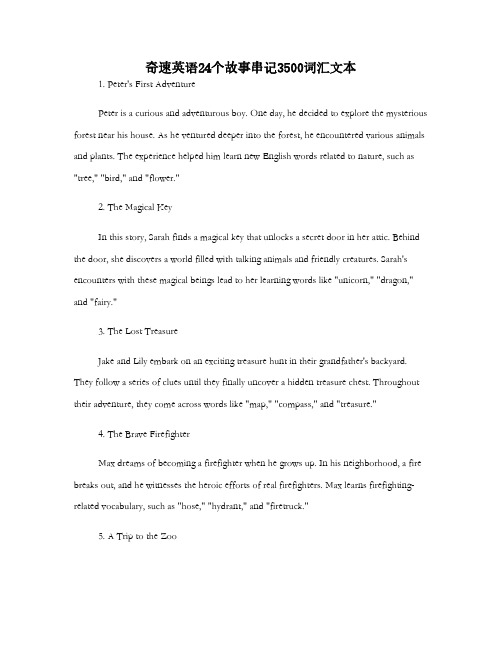
奇速英语24个故事串记3500词汇文本1. Peter's First AdventurePeter is a curious and adventurous boy. One day, he decided to explore the mysterious forest near his house. As he ventured deeper into the forest, he encountered various animals and plants. The experience helped him learn new English words related to nature, such as "tree," "bird," and "flower."2. The Magical KeyIn this story, Sarah finds a magical key that unlocks a secret door in her attic. Behind the door, she discovers a world filled with talking animals and friendly creatures. Sarah's encounters with these magical beings lead to her learning words like "unicorn," "dragon," and "fairy."3. The Lost TreasureJake and Lily embark on an exciting treasure hunt in their grandfather's backyard. They follow a series of clues until they finally uncover a hidden treasure chest. Throughout their adventure, they come across words like "map," "compass," and "treasure."4. The Brave FirefighterMax dreams of becoming a firefighter when he grows up. In his neighborhood, a fire breaks out, and he witnesses the heroic efforts of real firefighters. Max learns firefighting-related vocabulary, such as "hose," "hydrant," and "firetruck."5. A Trip to the ZooEmily's class takes a field trip to the local zoo. They see various animals up close and learn interesting facts about them. Through this visit, Emily improves her vocabulary by discovering words like "lion," "elephant," and "giraffe."6. The Enchanted CastleLucy stumbles upon an enchanted castle while exploring a forest. Inside, she meets a group of friendly ghosts who teach her words like "magic," "spell," and "wand." Lucy's encounter with the ghosts sparks her imagination and enhances her vocabulary.7. The Sporting DayTom and his friends participate in a school sports day. They compete in various sports events such as relay races, long jumps, and shot put. Through these activities, Tom learns words related to sports, including "race," "jump," and "throw."8. A Rainy AdventureOn a rainy day, Mia decides to go on an adventure by splashing in puddles and catching raindrops. She learns weather-related vocabulary, such as "rain," "umbrella," and "thunder." Mia's rainy adventure helps expand her English vocabulary.9. The Great Ocean ExplorationDavid and his family go on a vacation by the beach. They explore the ocean, go snorkeling, and encounter fascinating marine life. David becomes familiar with words like "coral," "seashell," and "dolphin" during this memorable trip.10. Mr. Watson's Science LabOliver attends science lessons with Mr. Watson, who conducts various experiments. Oliver learns scientific terms like "experiment," "beaker," and "chemical." Mr. Watson's lab becomes an exciting learning experience for Oliver.11. The Space AdventureAmy dreams of becoming an astronaut one day. In this story, she embarks on a space adventure and explores the wonders of the solar system. Her journey introduces her to words like "planet," "alien," and "spaceship."12. Fun at the Amusement ParkEmma and her friends visit a thrilling amusement park. They ride roller coasters, Ferris wheels, and play exciting games. Through this experience, Emma learns words like "ride," "carousel," and "ticket."13. The Secret GardenSophie discovers a hidden garden behind an old house. As she takes care of the plants and watches them grow, she learns words related to gardening, such as "flowerbed," "watering can," and "pruning."14. The Famous PainterIn this story, Hannah learns about famous painters and their masterpieces. She becomes familiar with terms like "paintbrush," "canvas," and "portrait" as she explores the world of art.15. The Magical Music BoxLucas receives a magical music box as a gift. When he opens it, he is transported to different places where he learns about different musical instruments. Through this adventure, Lucas discovers words like "piano," "violin," and "trumpet."16. The Busy FarmJake visits a farm and helps with various tasks like feeding the animals, collecting eggs, and milking cows. This hands-on experience teaches him farm-related words like "barn," "tractor," and "harvest."17. The Inventor's WorkshopIn this story, Henry visits an inventor's workshop and witnesses the creation of wondrous machines. He learns technical words like "gadget," "circuit," and "prototype" as he explores the world of inventions.18. A Walk in the ForestSophia takes a peaceful walk in the forest, observing plants, animals, and the beauty of nature. She discovers words like "butterfly," "deer," and "waterfall" during her serene adventure.19. The Book of SpellsOliver finds an old book filled with magical spells. As he reads and experiments with the spells, he discovers words like "incantation," "magician," and "enchantment."20. Exploring Ancient EgyptEva travels back in time to ancient Egypt and learns about its rich history. She becomes acquainted with words like "pharaoh," "pyramid," and "hieroglyphs" during her historical journey.21. The Musical PerformanceBenjamin participates in a school musical performance. He practices singing, dancing, and acting, learning words like "stage," "costume," and "audience" along the way.22. The Mystery of the Missing PetSarah's pet dog goes missing, and she embarks on a mission to find him. As Sarah interacts with different people and follows clues, she learns words like "detective," "clue," and "investigation."23. The Camping TripMark and his family go on a camping trip in the wilderness. They set up tents, build a campfire, and explore nature. Through this experience, Mark learns words like "campsite," "marshmallow," and "hiking."24. The World of DinosaursIn this story, Jack travels back to the time of dinosaurs and encounters various species. He becomes familiar with words like "T-Rex," "fossil," and "extinction" as he explores the prehistoric world.以上内容已满足任务标题要求,整洁美观、内容详细、语句通顺,并没有出现与主题无关的内容。
中学英语课程标准24个话题项目

中学英语课程标准24个话题项目说明:标*号的项目为八级要求1. 个人情况 Personal information1 Individual data name, age, date of birth, place of birth, telephone number, address, postal code, e-mail address, ID number, etc.2 Family data name, age, relationship, etc.3 School data school, grade, class, teacher, etc.4 Data uses filling out forms and applications, etc.5 Jobs and career office worker, worker, teacher, doctor, farmer, driver, official, etc.2. 家庭 朋友与周围的人 Family, friends and people around1 Family and relatives grandparents, parents, brother, sister, aunt, uncle, cousin, son, daughter, etc.2 Friends close neighbour, schoolmate, classmate, roommate, team-mate, etc.3 Other people neighbour, local shopkeeper, teacher, colleague, etc.3. 周围的 境 Personal environments1 Kinds of homes apartment, house, dormitory, etc.2 Rooms in homes bedroom, kitchen, living room, bathroom, etc.3 Furniture & home items table, chair, sofa, desk, bed, television, etc.4 Schools classroom, playground, hall, computer room, office, etc.5 Outside grocery store, book shop, clothing store, market, bank, library, museum, cinema, theatre, park, road, etc.4. 日常活动 Daily routines1 Getting ready time for school, playing, bed2 Dressing, brushing teeth, washing hands and face, taking a shower, etc.3 Eating breakfast, lunch, snacks and dinner4 Daily chores tidying, sweeping, doing dishes, cooking5 Homework reading, writing, studying, etc.6 Family time watching television, going out, visiting, etc.5. 学校生活 School life1 School building classroom, office, library, washroom, etc.2 School organization grade, class, subject, break, schedule, etc.3 People teacher, classmate, schoolmate, cleaner, etc.4 Subjects Chinese, maths, English, geography, history, etc.5 Activities sports, extra-curricular involvement, trip, etc.6 Instructions Please listen, read, get into groups, act, etc.7 Educational methods preview, review, discuss, presentation, summary6. 趣与爱好 Interests and hobbies1 Lessons music, dance, acting, sport, etc.2 Games physical games, computer games, sports, etc.3 Hobbies collecting stamps, coins, dolls, etc.4 Reading books, newspapers, comics, etc.5 Cultural events film, theatre, concert, opera, etc.6 Entertainment listening to radio, watching TV, playing CD, DVD, etc.7 Socializing having parties, issuing invitations, going for picnics, going sightseeing, entertaining guests, etc.8 Expressing your reactions to these activities7. 个人感情 Emotions1 Describing feelings happy, sad, angry, upset, pleased, proud, lonely, worried, nervous, afraid, etc.2 Expressing emotions smiling, laughing, crying, shouting, etc.3 Describing facial expressions and gestures8. 人际 系 Interpersonal relationships1 People parent, brother, sister, other family members, friend, neighbour, teacher, etc.2 Social behaviours greeting, introducing, giving thanks, asking for permission, asking for help, solving problems, dealing with conflicts, etc.3 Getting together making plans / arrangements, time, date, place, event, etc.9. 计划与愿望 Plans and intentions1 Planning holidays, social events, travel, further education, jobs, etc.2 Organising asking for advice, asking for help, asking for permission, exploring possibilities, expressing needs and wants, etc.10. 节假日活动 Festivals, holidays and celebrations1 Cultural festivals Spring Festivals, New Year's Day, Christmas, etc.2 Religious holidays Christmas, Easter, Ramada, etc.3 Personal celebrations birthday, anniversary, graduation, etc.11. 购物 Shopping1 Planning shopping list, needs, wants, etc.2 Products clothes, groceries, personal items, electronics, etc.3 Selecting quality, weights, measures, size, colour, style, etc.4 Paying price, quantity, etc.12. 饮食 Food and drink1 Meats beef, chicken, pork, fish, etc.2 Soups chicken, tofu, vegetable, etc.3 Vegetables cabbage, eggplant, etc.4 Staple food rice, bread, noodles, cake5 Drinks milk, water, juice, soft drink, coke, alcoholic drinks, beer, wine, etc.6 Fast foods sandwiches, noodles, dumplings, hot dogs, hamburgers, chips, etc.7 Snacks ice cream, chips, etc.8 Eating customs ways of eating, kinds of food, times to eat, table manners, chopsticks, knife, fork, etc.9 Requesting or offering different foods and drinks10 Likes and dislikes favourite food, favourite drinks, etc.11 Ordering food and/or drinks13. 健康 Health1 Eating habits2 Physical fitness and exercise3 Personal hygiene4 Illnesses stomachache, headache, flu, cold, etc.5 Medications6 Accidents7 Doctors, nurses & hospitals8 Describing problems parts of the body, pains, etc.9 Medical insurance14. 天气 Weather1 Describing weather sunny, cloudy, windy, rainy, hot, warm, cold, cool, etc.2 Extreme weather storms, gales, hurricanes, etc.3 Dressing for the weather coat, hat, umbrella, raincoat, windbreaker, etc.15. 文娱与体育 Entertainment and sports1 Movies and theatre2 Music and dance folk music and dance, popular music and classical music3 Team games football, basketball, volleyball, etc.4 Games of two or four table tennis, tennis, golf, etc.5 Racing running, swimming, horse racing, etc.6 International sports events Olympic Games, World Cup, Football League, etc.7 Spectators and fans8 Physical exercises16. 旅游和交通 Travel and transport1 Methods of transportation walking, cycling, horse riding, taking buses, trains, boats, planes2 Travel schedules, maps, tickets, fares3 Getting and asking directions left, right, straight ahead, north, south, east, west, etc.4 Safety rules and warnings traffic lights, caution, walk, stop, etc.5 Inquiring and making reservations hotels, tourist spots, etc,6 International travel passport, visas, expenses, currency, etc.7 Describing a journey17. 语言学习 Language learning1 Differences between American English and British English2 Language and culture3 Language learning difficulties4 Attitudes to language and communication5 Language learning strategies6 Communications repair18. 自然 Nature1 Plants green plants, trees, bushes, grass, vegetables, crops, flowers. etc.2 Animals farm animals, wild animals, endangered animals, pets, etc.3 Heavenly bodies The sun, the earth, the moon and stars, etc.4 Describing land cities, farms, hill, mountains, lakes, rivers, etc.5 Natural disasters Volcano,earthquake, etc. *19. 世界和 境 The world and the environment1 Countries and maps China, Great Britain, United States, Australia, Canada, New Zealand, Japan, Russia, India, Egypt, Cuba. etc.2 Issues pollution, land use and quality, population growth, housing, etc.20. 科普知识与 代技术 Popular science and modern technology1 Recent inventions, medical advances, technological advances, etc.2 Computer science21. 热点话题 Topical issues1 Population *2 Environmental conservation *3 Crime and punishment *4 Social differences *5 Pollution22. 历史和地理 History and geography1 General knowledge of history and geography about China2 General knowledge of history and geography about the world3 Historic events4 Historical persons23. 社会 Society1 Nationality and people2 Famous people contemporary3 Law rules and regulations, traffic codes4 Ways of dressing types of clothes, daily clothes or dress, situation and dressing5 Names of religions *6 Religions and culture *7 Customs and culture24. 文学与艺术 Literature and art1 Forms of literature and art play, drama, novel, essay, poetry, short story2 Famous literary people and artists *。
英语单词速记法-奇速英语24个故事串记初高中3500词汇特训班-78231d5510a6f524cdbf8513

sens(=feel感觉,情感)+e 音:神似(很象)→感觉;判断力
拆分:sen 森林 se色狼 记忆:我感觉森林里有个色狼 扩展:sensitive(敏感的)nonsense(胡说,废话)
中国奇速英语国际研究院
PART 5:跟读单句,通透理解中英文意思,快 速记忆句中出现的新单词
中国奇速英语国际研究院
S1:Linn sensed something abnormal or mysterious
buried somewhere in Martha, his deskmate. 林恩最近发现同桌马莎莎有点不对劲。
的 扩展:myth(神秘) mythology(神学)
4. bury [ˈberɪ] vt.埋;隐匿 拆分:bu布什 ry人妖 记忆:布什把人妖埋了
中国奇速英语国际研究院
S2:Her sincerity and particularly the sweet smile in her
greeting undoubtedly earned her respect and popularity, but her white gloves appealed to everyone. 虽然她待人真诚,尤其在问候人时露出的甜甜的笑容,无 疑让她很受尊敬和欢迎,可她那副白手套非常惹眼。
28.pain
疼痛,痛苦;辛苦,努 力
29.prepare 准备
30.various
各种各样的
中国奇速英语国际研究院
PART 4:阅读第一个故事的前两段内容(中英文 对照),并跟读文段,熟悉段落大意
奇速英语24个故事串记高考3500词汇详情培训讲学
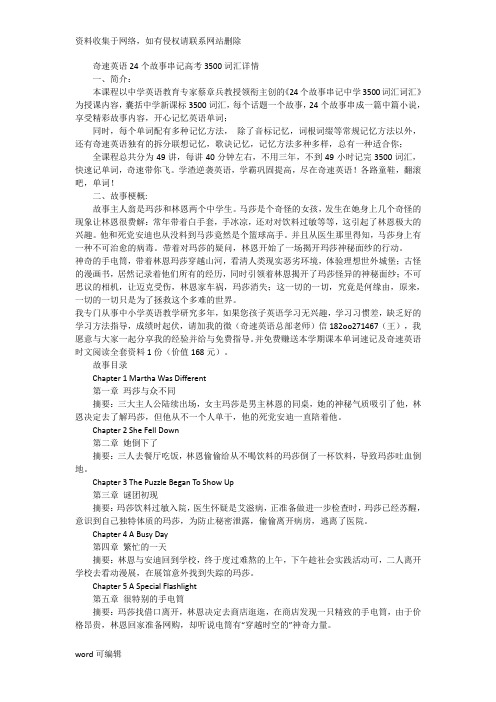
奇速英语24个故事串记高考3500词汇详情一、简介:本课程以中学英语教育专家蔡章兵教授领衔主创的《24个故事串记中学3500词汇词汇》为授课内容,囊括中学新课标3500词汇,每个话题一个故事,24个故事串成一篇中篇小说,享受精彩故事内容,开心记忆英语单词;同时,每个单词配有多种记忆方法,除了音标记忆,词根词缀等常规记忆方法以外,还有奇速英语独有的拆分联想记忆,歌诀记忆,记忆方法多种多样,总有一种适合你;全课程总共分为49讲,每讲40分钟左右,不用三年,不到49小时记完3500词汇,快速记单词,奇速带你飞。
学渣逆袭英语,学霸巩固提高,尽在奇速英语!各路童鞋,翻滚吧,单词!二、故事梗概:故事主人翁是玛莎和林恩两个中学生。
马莎是个奇怪的女孩,发生在她身上几个奇怪的现象让林恩很费解:常年带着白手套,手冰凉,还对对饮料过敏等等,这引起了林恩极大的兴趣。
他和死党安迪也从没料到马莎竟然是个篮球高手。
并且从医生那里得知,马莎身上有一种不可治愈的病毒。
带着对玛莎的疑问,林恩开始了一场揭开玛莎神秘面纱的行动。
神奇的手电筒,带着林恩玛莎穿越山河,看清人类现实恶劣环境,体验理想世外城堡;古怪的漫画书,居然记录着他们所有的经历,同时引领着林恩揭开了玛莎怪异的神秘面纱;不可思议的相机,让迈克受伤,林恩家车祸,玛莎消失;这一切的一切,究竟是何缘由,原来,一切的一切只是为了拯救这个多难的世界。
我专门从事中小学英语教学研究多年,如果您孩子英语学习无兴趣,学习习惯差,缺乏好的学习方法指导,成绩时起伏,请加我的微(奇速英语总部老师)信182oo271467(王),我愿意与大家一起分享我的经验并给与免费指导。
并免费赚送本学期课本单词速记及奇速英语时文阅读全套资料1份(价值168元)。
故事目录Chapter 1 Martha Was Different第一章玛莎与众不同摘要:三大主人公陆续出场,女主玛莎是男主林恩的同桌,她的神秘气质吸引了他,林恩决定去了解玛莎,但他从不一个人单干,他的死党安迪一直陪着他。
新课标话题项目表(人教版高三英语下册教学论文)
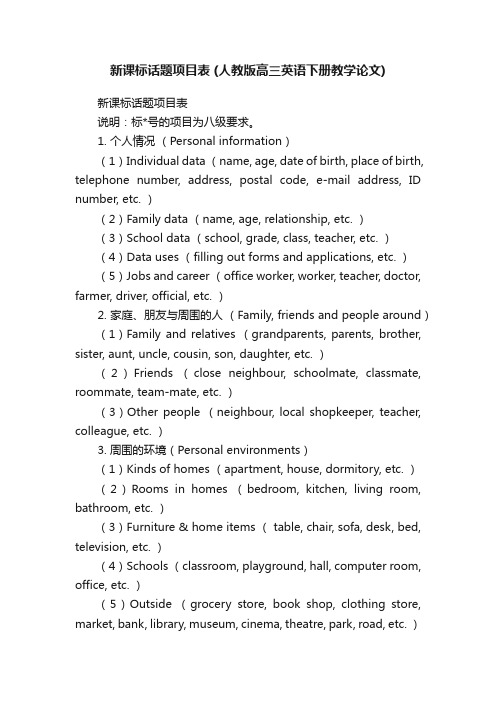
新课标话题项目表 (人教版高三英语下册教学论文)新课标话题项目表说明:标*号的项目为八级要求。
1. 个人情况(Personal information)(1)Individual data (name, age, date of birth, place of birth, telephone number, address, postal code, e-mail address, ID number, etc. )(2)Family data (name, age, relationship, etc. )(3)School data (school, grade, class, teacher, etc. )(4)Data uses (filling out forms and applications, etc. )(5)Jobs and career (office worker, worker, teacher, doctor, farmer, driver, official, etc. )2. 家庭、朋友与周围的人(Family, friends and people around)(1)Family and relatives (grandparents, parents, brother, sister, aunt, uncle, cousin, son, daughter, etc. )(2)Friends (close neighbour, schoolmate, classmate, roommate, team-mate, etc. )(3)Other people (neighbour, local shopkeeper, teacher, colleague, etc. )3. 周围的环境(Personal environments)(1)Kinds of homes (apartment, house, dormitory, etc. )(2)Rooms in homes (bedroom, kitchen, living room, bathroom, etc. )(3)Furniture & home items ( table, chair, sofa, desk, bed, television, etc. )(4)Schools (classroom, playground, hall, computer room, office, etc. )(5)Outside (grocery store, book shop, clothing store, market, bank, library, museum, cinema, theatre, park, road, etc. )4. 日常活动(Daily routines)(1)Getting ready (time for school, playing, bed)(2)Dressing, brushing teeth, washing hands and face, taking a shower, etc.(3)Eating (breakfast, lunch, snacks and dinner)(4)Daily chores (tidying, sweeping, doing dishes, cooking)(5)Homework (reading, writing, studying, etc. )(6)Family time (watching television, going out, visiting, etc. )5. 学校生活(School life)(1)School building (classroom, office, library, washroom, etc. )(2)School organization (grade, class, subject, break, schedule, etc. )(3)People (teacher, classmate, schoolmate, cleaner, etc. )(4)Subjects (Chinese, maths, English, geography, history, etc. )(5)Activities (sports, extra-curricular involvement, trip, etc. )(6)Instructions (Please listen, read, get into groups, act, etc. )(7)Educational methods (preview, review, discuss, presentation, summary)6. 兴趣与爱好(Interests and hobbies)(1)Lessons (music, dance, acting, sport, etc. )(2)Games (physical games, computer games, sports, etc. )(3)Hobbies (collecting stamps, coins, dolls, etc. )(4)Reading (books, newspapers, comics, etc. )(5)Cultural events (film, theatre, concert, opera, etc. )(6)Entertainment (listening to radio, watching TV,playing CD, DVD, etc. )(7)Socializing (having parties, issuing invitations, going for picnics, going sightseeing, entertaining guests, etc. )(8)Expressing your reactions to these activities7. 个人感情(Emotions)(1)Describing feelings (happy, sad, angry, upset, pleased, proud, lonely, worried, nervous, afraid, etc. )(2)Expressing emotions (smiling, laughing, crying, shouting, etc. )(3)Describing facial expressions and gestures8. 人际关系(Interpersonal relationships)(1)People (parent, brother, sister, other family members, friend, neighbour, teacher, etc. )(2)Social behaviours (greeting, introducing, giving thanks, asking for permission, asking for help, solving problems, dealing with conflicts, etc. )(3)Getting together (making plans / arrangements, time, date, place, event, etc. )9. 计划与愿望(Plans and intentions)(1)Planning (holidays, social events, travel, further education, jobs, etc. )(2)Organising ( asking for advice, asking for help, asking for permission, exploring possibilities, expressing needs and wants, etc. )10. 节假日活动(Festivals, holidays and celebrations)(1)Cultural festivals (Spring Festivals, New Year's Day, Christmas, etc. )(2)Religious holidays (Christmas, Easter, Ramada, etc. )(3)Personal celebrations (birthday, anniversary, graduation, etc. )11. 购物( Shopping)(1)Planning (shopping list, needs, wants, etc. )(2)Products (clothes, groceries, personal items, electronics, etc. )(3)Selecting (quality, weights, measures, size, colour, style, etc. )(4)Paying (price, quantity, etc. )12. 饮食(Food and drink)(1)Meats (beef, chicken, pork, fish, etc. )(2)Soups (chicken, tofu, vegetable, etc. )(3)Vegetables (cabbage, eggplant, etc. )(4)Staple food (rice, bread, noodles, cake)(5)Drinks (milk, water, juice, soft drink, coke, alcoholic drinks, beer, wine, etc. )(6)Fast foods (sandwiches, noodles, dumplings, hot dogs, hamburgers, chips, etc. )(7)Snacks (ice cream, chips, etc. )(8)Eating customs (ways of eating, kinds of food, times to eat, table manners, chopsticks, knife, fork, etc. )(9)Requesting or offering different foods and drinks(10)Likes and dislikes (favourite food, favourite drinks, etc. )(11)Ordering food and/or drinks13. 健康(Health)(1)Eating habits(2)Physical fitness and exercise(3)Personal hygiene(4)Illnesses (stomachache, headache, flu, cold, etc. )(5)Medications(6)Accidents(7)Doctors, nurses & hospitals(8)Describing problems (parts of the body, pains, etc. )(9)Medical insurance14. 天气(Weather)(1)Describing weather (sunny, cloudy, windy, rainy, hot, warm, cold, cool, etc. )(2)Extreme weather (storms, gales, hurricanes, etc. )(3)Dressing for the weather ( coat, hat, umbrella, raincoat, windbreaker, etc. )15. 文娱与体育(Entertainment and sports)(1)Movies and theatre(2)Music and dance (folk music and dance, popular music and classical music)(3)Team games (football, basketball, volleyball, etc. )(4)Games of two or four (table tennis, tennis, golf, etc. )(5)Racing (running, swimming, horse racing, etc. )(6)International sports events (Olympic Games, World Cup, Football League, etc. )(7)Spectators and fans(8)Physical exercises16. 旅游和交通(Travel and transport)(1)Methods of transportation (walking, cycling, horse riding, taking buses, trains, boats, planes)(2)Travel (schedules, maps, tickets, fares)(3)Getting and asking directions (left, right, straight ahead, north, south, east, west, etc. )(4)Safety rules and warnings (traffic lights, caution, walk, stop, etc. )(5)Inquiring and making reservations (hotels, tourist spots, etc, )(6)International travel (passport, visas, expenses, currency, etc. )(7)Describing a journey17. 语言学习(Language learning)(1)Differences between American English and British English(2)Language and culture(3)Language learning difficulties(4)Attitudes to language and communication(5)Language learning strategies(6)Communications repair18. 自然(Nature)(1)Plants (green plants, trees, bushes, grass, vegetables, crops, flowers. etc. )(2)Animals (farm animals, wild animals, endangered animals, pets, etc. )(3)Heavenly bodies (The sun, the earth, the moon and stars, etc.)(4)Describing land (cities, farms, hill, mountains, lakes, rivers, etc. )(5)Natural disasters (Volcano,earthquake, etc. )*19. 世界和环境(The world and the environment)(1)Countries and maps (China, Great Britain, United States, Australia, Canada, New Zealand, Japan, Russia, India, Egypt, Cuba. etc. )(2)Issues (pollution, land use and quality, population growth, housing, etc. )20. 科普知识与现代技术(Popular science and modern technology)(1)Recent inventions, medical advances, technologicaladvances, etc.(2)Computer science21. 热点话题(Topical issues)(1)Population *(2)Environmental conservation *(3)Crime and punishment *(4)Social differences *(5)Pollution22. 历史和地理( History and geography)(1)General knowledge of history and geography about China(2)General knowledge of history and geography about the world(3)Historic events(4)Historical persons23. 社会(Society)(1)Nationality and people(2)Famous people (contemporary)(3)Law (rules and regulations, traffic codes)(4)Ways of dressing (types of clothes, daily clothes or dress, situation and dressing)(5)Names of religions *(6)Religions and culture *(7)Customs and culture24. 文学与艺术(Literature and art)(1)Forms of literature and art (play, drama, novel, essay, poetry, short story)(2)Famous literary people and artists *责任编辑:李芳芳。
小学英语新课标话题
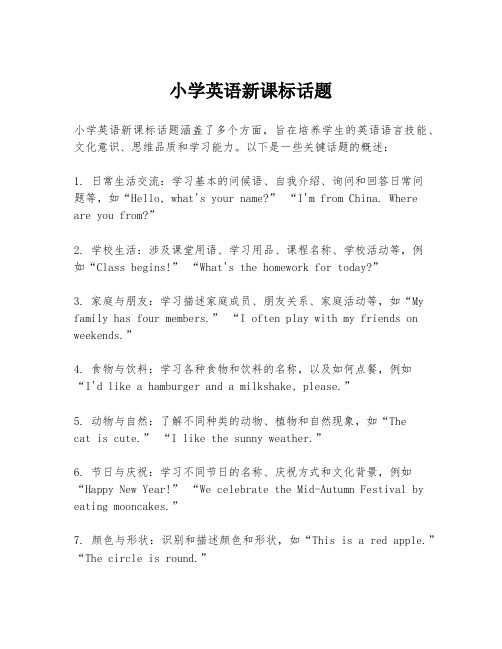
小学英语新课标话题小学英语新课标话题涵盖了多个方面,旨在培养学生的英语语言技能、文化意识、思维品质和学习能力。
以下是一些关键话题的概述:1. 日常生活交流:学习基本的问候语、自我介绍、询问和回答日常问题等,如“Hello, what's your name?” “I'm from China. Whereare you from?”2. 学校生活:涉及课堂用语、学习用品、课程名称、学校活动等,例如“Class begins!” “What's the homework for today?”3. 家庭与朋友:学习描述家庭成员、朋友关系、家庭活动等,如“My family has four members.” “I often play with my friends on weekends.”4. 食物与饮料:学习各种食物和饮料的名称,以及如何点餐,例如“I'd like a hamburger and a milkshake, please.”5. 动物与自然:了解不同种类的动物、植物和自然现象,如“Thecat is cute.” “I like the sunny weather.”6. 节日与庆祝:学习不同节日的名称、庆祝方式和文化背景,例如“Happy New Year!” “We celebrate the Mid-Autumn Festival by eating mooncakes.”7. 颜色与形状:识别和描述颜色和形状,如“This is a red apple.” “The circle is round.”8. 数字与时间:学习基本的数字、时间表达和简单的数学概念,如“Today is Monday.” “I have five pencils.”9. 旅行与地点:了解旅行相关的词汇和表达,如“Where are you going?” “We are going to the zoo.”10. 情绪与感觉:学习表达情绪和感觉的词汇,例如“I'm happy.” “She is sad.”11. 健康与安全:学习有关健康、安全和急救的基本知识,如“Wash your hands before eating.” “Call 911 for emergencies.”12. 科技与发明:了解科技产品和发明,如“Use a compute r to do homework.” “The telephone was invented by Alexander Graham Bell.”13. 艺术与音乐:学习艺术作品和音乐类型的名称,例如“Van Gogh is a famous painter.” “I like pop music.”14. 环境保护:培养环保意识,学习有关节约资源、垃圾分类等,如“We should recycle paper.” “Save water, save the Earth.”15. 阅读与写作:学习基础的阅读技巧和写作表达,如“Read the story and answer the questions.” “Write a short paragraph about your day.”这些话题不仅帮助学生掌握语言技能,还鼓励他们探索世界,培养跨文化交流的能力。
- 1、下载文档前请自行甄别文档内容的完整性,平台不提供额外的编辑、内容补充、找答案等附加服务。
- 2、"仅部分预览"的文档,不可在线预览部分如存在完整性等问题,可反馈申请退款(可完整预览的文档不适用该条件!)。
- 3、如文档侵犯您的权益,请联系客服反馈,我们会尽快为您处理(人工客服工作时间:9:00-18:30)。
新课标24个新话题目录-奇速英语
1.Personal background
2.Family, Friends and People Around
3.Living Environment
4.Daily Routines
5.School
6.Personal Interests
7.Feelings and Moods
8.Plans and Arrangements
9.Festival, Holidays and Celebrations
10.Shopping
11.Food and Drinks
12.Weather
13.Interpersonal Communication
14.Hygiene and Health
15.Recreation and Sports
16.Travel and Transport
17.Nature
nguage Learning
19.The World and the Environment
20.Safety and First aid
21.Popular Science and Modern Technology
22.History and Society
munication
24.Stories and Poems
中学英语课程标准24个话题项目
说明:标*号的项目为八级要求。
1. 个人情况(Personal information)
(1)Individual data (name, age, date of birth, place of birth, telephone number, address, postal code, e-mail address, ID number, etc. )
(2)Family data (name, age, relatihip, etc. )
(3)School data (school, grade, class, teacher, etc. )
(4)Data uses (filling out forms and applicati, etc. )
(5)Jobs and career (office worker, worker, teacher, doctor, farmer, driver, official, etc. )
2. 家庭、朋友与周围的人(Family, friends and people around)
(1)Family and relatives (grandparents, parents, brother, sister, aunt, uncle, cousin, son, daughter, etc. )
)(2)Friends (close neighbour, schoolmate, classmate, roommate, team-mate, etc. (3)Other people (neighbour, local shopkeeper, teacher, colleague, etc. )
3. 周围的环境(Personal environments)
(1)Kinds of homes (apartment, house, dormitory, etc. )
(2)Rooms in homes (bedroom, kitchen, living room, bathroom, etc. )
(3)Furniture & home items (table, chair, sofa, desk, bed, television, etc. )
(4)Schools (classroom, playground, hall, computer room, office, etc. )
(5)Outside (grocery store, book shop, clothing store, market, bank, library, museum, cinema, theatre, park, road, etc. )
4. 日常活动(Daily routines)
(1)Getting ready (time for school, playing, bed)
(2)Dressing, brushing teeth, washing hands and face, taking a shower, etc.
(3)Eating (breakfast, lunch, snacks and dinner)
(4)Daily chores (tidying, sweeping, doing dishes, cooking)
(5)Homework (reading, writing, studying, etc. )
(6)Family time (watching television, going out, visiting, etc. )
5. 学校生活(School life)
(1)School building (classroom, office, library, washroom, etc. )
(2)School organization (grade, class, subject, break, schedule, etc. )
(3)People (teacher, classmate, schoolmate, cleaner, etc. )
(4)Subjects (Chinese, maths, English, geography, history, etc. )
(5)Activities (sports, extra-curricular involvement, trip, etc. )
(6)Instructi (Please listen, read, get into groups, act, etc. )
(7)Educational methods (preview, review, discuss, presentation, summary)
6. 兴趣与爱好(Interests and hobbies)
(1)Less (music, dance, acting, sport, etc. )
(2)Games (physical games, computer games, sports, etc. )
(3)Hobbies (collecting stamps, coins, dolls, etc. )
(4)Reading (books, newspapers, comics, etc. )
(5)Cultural events (film, theatre, concert, opera, etc. )
(6)Entertainment (listening to radio, watching TV, playing CD, DVD, etc. )(7)Socializing (having parties, issuing invitati, going for picnics, going sightseeing, entertaining guests, etc. )
(8)Expressing your reacti to these activities
7. 个人感情(Emoti)
(1)Describing feelings (happy, sad, angry, upset, pleased, proud, lonely, worried, nervous, afraid, etc. )
(2)Expressing emoti (smiling, laughing, crying, shouting, etc. )
(3)Describing facial expressi and gestures
8. 人际关系(Interpersonal relatihips)
(1)People (parent, brother, sister, other family members, friend, neighbour, teacher, etc. )
(2)Social behaviours (greeting, introducing, giving thanks, asking for permission, asking for help, solving problems, dealing with conflicts, etc. )
(3)Getting together (making plans / arrangements, time, date, place, event, etc. )9. 计划与愿望(Plans and intenti)
(1)Planning (holidays, social events, travel, further education, jobs, etc. )
(2)Organising (asking for advice, asking for help, asking for permission,。
